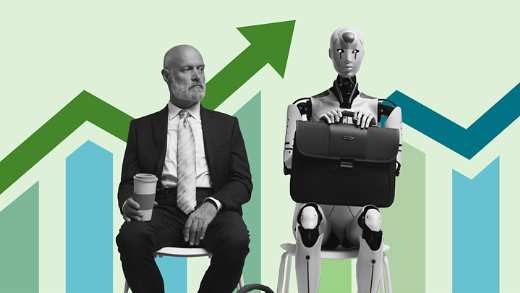Emmanuel Macron’s election as French president has raised hopes that the European project is set to be given renewed impetus. This could mark a sea change for financial markets, writes Ahmed Behdenna.
7 minute read

After years of pessimism over the future of the euro zone, the currency bloc’s prospects in recent weeks appear to have taken an abrupt turn for the better. Europe’s economies have begun to strengthen at the same time as political risks have started to fade in the wake of Dutch and French elections. Perhaps most significantly, it appears the European Union (EU), faced with the emergence of a trio of external existential threats, may be on the verge of instigating reforms that are vital to its long-term survival.
Macron’s election success had much to do with voters seeing a strong EU as the best response to the uncertainty caused by US President Donald Trump’s moves away from established international alliances, Russia’s increased military assertiveness in eastern Europe and Britain’s ‘Brexit’ vote.
Even in Germany, where pessimism over the euro has been rife for so long, the EU is being seen as a vote winner. Chancellor Angela Merkel and her Social Democrat challenger Martin Schulz are vying to be seen as the candidate best placed to strengthen the bloc in their campaigns for September’s parliamentary election. For investors, a functional Franco-German axis will be critical for the European project, especially to drive necessary reforms.
Yet, while European equity markets and the euro have responded positively, financial markets have arguably yet to factor in the full implications of recent events.
Defence first
Many investors have long held the view that the euro zone can only make progress towards closer integration if it is going through a crisis. But there are two key differences between the current situation and previous crises which give grounds for optimism.
Firstly, political leaders are talking about reforming Europe at a time when the continent’s economies are performing comparatively well. That will make it easier for leaders such as Macron to push through what are likely to prove controversial proposals, such as reform of France’s labour market.
Secondly, the crisis this time is largely not of Europe’s own making. Political leaders have been stung into action by three external events – Trump’s election, Brexit and the aggressive actions of Russian President Vladimir Putin – which have called the EU’s survival into question.
With the world looking more fractious, divided and dangerous than for a generation, the task of completing the EU project has been given added urgency. Macron and Merkel have vowed to deepen integration and reinforce the euro zone. The first test will come in Paris on July 13 when the two countries are scheduled to hold a joint cabinet meeting as part of efforts to reinvigorate the German-French relationship at the core of the euro area.
Security and defence will be high up the agenda. It has always been apparent to people on the continent that the EU has been about much more than economics. It is first and foremost about security. With Trump’s attitude to NATO uncertain, Macron has warned Europeans must learn to live with the fact that Washington in the long-term wishes to concern itself less with Europe’s security. He is pushing for deeper security integration to supplement NATO’s role and in Merkel appears to have a willing partner. She said in May, following what she described as an “unsatisfactory” G7 summit: “the era in which we could fully rely on others is over to some extent”.
Although Berlin and Paris are far from agreed on how to build a more effective defence capability, and how far and under what circumstances to intervene abroad, we expect the two nations to make swift headway towards more cooperation on defence following the German election.
That in turn would be an important signal of their determination to push for greater European integration in other areas too, most notably the economy. Indeed, Macron has made it clear he intends to use France’s major contribution to European defence and security as a lever to help secure a breakthrough on that front. We expect to see early progress in strengthening the currency union’s ‘financial architecture’, with the ultimate goal of completing the banking union more credible than in the past.
Stepping towards a banking union
The euro zone debt crisis showed banks can suffer big losses from holdings of their own countries' bonds, which in turn can torpedo state finances if banks need to be bailed out. A primary aim of a banking union would be to cut the link between banks and national budgets. The recent restructuring of Italian lenders Banca Monte dei Paschi di Siena, Veneto Banca and Banca Popolare di Vicenza served to highlight that the link between governments and banks has not been broken.
According to the European Parliament, a banking union is primarily made up of three major components: a single bank supervisor; a common bank crisis management and resolution system; and a uniform system for protecting depositors' savings. The first of these pillars is already in place, as are elements of the second. Unfortunately the third remains some way off.
Germany and other northern EU states last year blocked a plan to establish a common fund to protect bank depositors. They feared that in setting up of a European deposit insurance scheme that would cover individual deposits of up to 100,000 euros, they may have ended up paying to rescue depositors in other countries.
Undoubtedly, there are significant challenges ahead that are unlikely to be meaningfully discussed before the German elections. However, there is at least the political will to make progress.
Banco Popular in Spain was the first bank resolved by the European Central Bank (ECB) This marked the first significant case where the ECB acted as a supranational regulator. Crucially, this development was well received by the market.
While a fully-fledged fiscal union is further off, even here there have been signs of progress. It is vital now that countries such as France and Italy engage in structural reforms. The recent success of Macron increases the probability of this happening in France.
Macron economic reform
France could be set to embark on the sort of widespread economic reforms long demanded of it by Berlin. Macron says the country will stick to EU rules requiring it to keep its budget deficit to three per cent of gross domestic product. He is targeting a €60 billion reduction in public spending by 2022, helped by cutting up to 120,000 state jobs by not replacing retiring civil servants.
Among other changes Macron wants to lower France’s corporate tax to 25 per cent from 33.3 per cent and has vowed to make the labour market more flexible. In return, he wants German acceptance of the need for a euro zone finance minister and euro zone budget.
However, the fiscal situation in France means some of the reforms proposed by Macron are likely to be delayed. The French public spending watchdog has warned that spending will need to be reduced if France is to achieve its three per cent budget deficit target this year. So far the signs from Berlin have been encouraging, with Merkel stating she could be persuaded to back both proposals "if it is clear that we are really strengthening the structure of the economy and doing sensible things".
With most Germans still resentful of the billions of euros spent on bailing out Greece, Merkel is treading carefully, ensuring her support for these measures is counter-balanced with the apparent insistence that there could be no mutualisation of individual state debt.
Berlin softening its stance
While Berlin does not want German taxpayers to have to underwrite high spending elsewhere in the EU without oversight, there are some signs the country is at least softening its stance. Wolfgang Schäuble, the normally hardline finance minister, recently told German news magazine Der Spiegel there was a need for transfers between wealthier and poorer EU states. “A community cannot exist without the strong vouching for the weaker ones,” he said.
He agreed with his French counterpart Bruno Le Maire that euro zone integration “had not been moving fast enough” and that Germany and France should “take a leading role" in strengthening the European Union in challenging times. The two promised to set up a working group that will look at how the currency bloc can better coordinate economic policies, harmonise its tax regime and find potential Franco-German investment projects.
This is not the first time France has elected a president promising a root and branch reform of the economy. To date none have delivered. It remains to be seen whether Macron’s time in office will meet with more success. He wants to introduce legislation to allow companies to hire and fire more easily, negotiate working hours and wages directly with employees and not via the unions, and cap unfair dismissal pay-outs. The proposals look certain to meet stiff opposition from unions and left-wing politicians alike. Hard-left firebrand Jean-Luc Mélenchon recently vowed not a single concession on workers’ rights without a fight – on the streets if necessary.
Reasons to be cheerful
However, there are reasons to believe Macron may succeed where others have failed. Not only does he have a very big majority in parliament, but one important difference with previous presidents such as Nicolas Sarkozy, is the structural reforms he wants to introduce were actually outlined in his manifesto.
While strikes may ensue, Macron should be able to tough it out. There is a willingness among citizens to try something new and even the unions are aware that something needs to be done to cut chronic unemployment. We expect Macron will be discussing his proposed reforms with the unions, well aware that he needs to act fast. He is likely to try to push through the toughest reforms at the beginning of his term.
Significant developments are unlikely ahead of German elections on September. But thereafter, we expect to see progress. The fact Macron has come into power on a reformist agenda is offering the quid pro quo Germany has long been looking for, especially if other countries such as Italy can be persuaded of the need to make similar economic reforms.
So far the EU has arguably been little more than a big bureaucracy run by technocrats. But suddenly, Europe looks to be getting its act together politically. For example, it was telling that within an hour of Trump announcing he would pull the US out of the Paris-climate agreement, the heads of state of France, Germany and Italy had signed a joint communique condemning his decision.
Asset market outlook
To date financial markets’ reaction to recent developments has been fairly tame. Foreign institutional investors, mindful of previous disappointments, appear wary of committing fresh funds to European assets.
However, with a revival in the region’s economic fortunes underway, further evidence of political integration could be a game changer for investors. The euro zone has arguably begun to look more stable than the US or UK in some respects. Certainly we see little prospect of an early return of speculation the euro zone might break up.
We expect sentiment to pick up further once the German elections are out of the way, and this is likely to result in inflows into European assets, especially equities, which should benefit from both the improved economic outlook and the prospect for deeper political integration. The strong earnings season last quarter showed a broad-based improvement in the economy.
The euro looks undervalued too, and is heading higher in our view. We continue to believe the ECB will deal with tapering before starting to increase rates, and the market is likely to incorporate ECB tightening further in the price. As for bond markets, the outlook is negative given the strength of the economic data and that the ECB is on a path towards exiting monetary easing. ‘Peripheral’ sovereign debt markets are likely to outperform core ones. The financial sector, banks in particular, seems likely to benefit from the change in monetary policy.
Financial markets have until recently been fixated on the risks posed by a series of European elections and the euro zone’s perennial economic problems. As the European Union slowly transitions from bureaucracy to a political entity it is only a matter of time before sentiment turns more decisively. There are definitely risks to the scenario, including the Italian election next year. However, the market is likely to acknowledge progress has been made. For the first time in the last decade or so, we should be talking about the upside for the European Union, rather than focusing solely on downside risks.
















